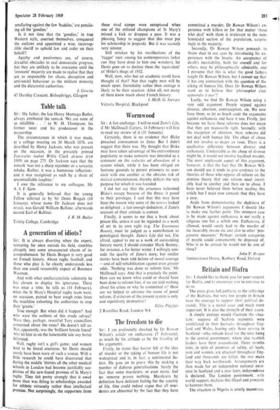Wormwood
Sir : A fair exchange : I will re-read Zeno's Life, if Mr McDouall (Letters, 14 February) will first re-read my review of it (31 January).
Certainly, there is no evidence that Blake preached communism to Zeno. But I didn't suggest that there was. My thought that Blake may have taken advantage of his extraordinary popularity to make converts was intended as a comment on the reductio ad absurdunz of a system which, while it has been obliged on humane grounds to permit prisoners to asso- ciate with one another at the obvious risk of mutual contamination, thereby defeats the very purpose for which it was founded.
I did not say that the prisoners welcomed Blake's escape because of the threat it posed to their privileges. I said that this may have been the reason why some of the screws looked so delighted : a fair enough deduction, if Zeno's account of their attitude is correct.
Finally, it seems to me that a book about prison life, unless it can be regarded as a work of art in its own right (e.g. The Enormous Room), must be judged as a contribution to penological thought. Zeno's Life did not, I'm afraid, appeal to me as a work of outstanding literary merit; I should consider Mark Benney, for instance, a far better writer. I willingly con- cede the quality of Zeno's story, but similar stories have been told before of moral courage —and of self-rehabilitation against even greater odds. 'Nothing was done to reform him,' Mr McDouall says. And that is precisely the point.
How can we know what could or should have been done to reform him, if we are told nothing about, his crime or why he committed it? How are we helped to advance the cause of penal reform, if criticism of the present system is only and repetitively destructive?
2 Ramillies Road, London W4 Giles Play fair


































 Previous page
Previous page